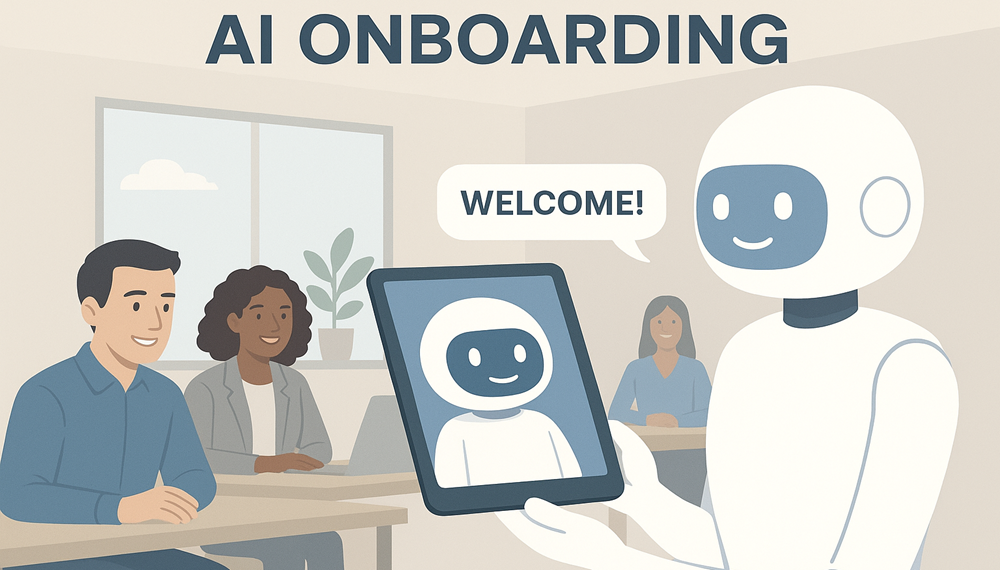Starting a new job is exciting, but it is also one of the most stressful moments in an employee’s career. Studies show that nearly 30 percent of new hires quit within the first 90 days because they feel disconnected, unsupported, or overwhelmed. Traditional onboarding often focuses on compliance and paperwork, leaving employees without the guidance they need to thrive in their new role.
This is where AI onboarding coaching is making a difference. By combining structured guidance with personalized support, organizations can reduce stress, improve engagement, and create a smoother transition for employees. Let’s explore how this new approach is reshaping the employee experience and performance.
Why Onboarding Needs a Rethink
The onboarding phase is more than just introducing policies and procedures. It is the stage where employees decide whether they feel connected to the company culture. If the process feels rushed or disconnected, it can negatively impact retention.
Common challenges in traditional onboarding include:
- Information overload during the first week
- Lack of personalized support
- Managers being too busy to guide new hires
- Limited focus on new hire wellbeing
- Difficulty maintaining engagement after the initial orientation
Without meaningful support, new hires may feel like outsiders. AI-driven solutions are helping organizations shift this experience from being transactional to being transformational.
The Role of AI Onboarding Coaching
AI onboarding coaching acts like a digital guide, offering timely and personalized support that complements the efforts of managers and HR teams. Instead of relying solely on human interactions, AI provides consistent check-ins, nudges, and resources tailored to each employee’s needs.
Here is how it works in practice:
- Personalized Guidance – Employees receive tailored prompts based on their role, skill level, and learning style.
- Wellbeing Check-Ins – AI can monitor stress signals through surveys or feedback, helping to address onboarding stress AI challenges.
- Interactive Learning – Instead of static presentations, new hires can engage in conversational AI modules that make learning more natural.
- Feedback Loops – Continuous insights help managers understand where new hires may need additional support.
By blending coaching with technology, organizations create a smoother onboarding process that feels supportive rather than overwhelming.
Reducing Onboarding Stress with AI
Starting a new job often brings social anxiety, learning new systems, meeting colleagues, and adjusting to expectations all at once. Onboarding stress AI tools are designed to detect early warning signs of fatigue or disengagement.
For example, an AI system might notice that a new hire consistently misses training modules. Instead of penalizing them, the AI can suggest micro-breaks, mindfulness exercises, or recommend reaching out to a peer mentor. These small interventions protect employee wellbeing and build trust in the organization.
Employees who feel supported during onboarding are 70 percent more likely to stay with the company for three years.
This data-driven approach directly contributes to new hire wellbeing, which has become a critical metric for organizations aiming to reduce turnover costs.
AI Coaching and Engagement
Engagement is one of the strongest predictors of long-term retention. Traditional onboarding often loses momentum after the first week, leaving new hires disengaged. Onboarding support AI keeps employees engaged by offering ongoing touchpoints throughout the first 90 days.
Some examples include:
- Weekly check-ins with AI-driven questions
- Celebrating milestones such as completing training modules
- Offering resources tailored to job-specific challenges
- Encouraging social connections through team introductions
This constant engagement fosters confidence, builds loyalty, and keeps employees motivated.
A Comparison: Traditional vs AI-Supported Onboarding
| Aspect | Traditional Onboarding | With AI Onboarding Coaching |
| Support | Limited to HR and managers | Continuous digital guidance |
| Engagement | Drops after first week | Sustained through ongoing prompts |
| Wellbeing | Often overlooked | Actively monitored and supported |
| Personalization | One-size-fits-all | Tailored to role and preferences |
| Retention Impact | Higher early turnover | Improved retention and loyalty |
This comparison shows how AI onboarding coaching does not replace human touch, but enhances it with continuous, reliable, and data-informed support.
Linking AI Coaching to Organizational Wellbeing
The shift towards AI-supported onboarding reflects a broader trend of integrating technology into workplace wellbeing strategies. Companies that already invest in Personalized Wellness AI are finding it easier to extend similar approaches to onboarding. By combining wellbeing and performance support, organizations can set a strong foundation for long-term success.
In fact, the Rise of Corporate Wellbeing AI demonstrates how leaders are prioritizing holistic employee care. Onboarding is a natural extension of this, ensuring employees feel valued and supported from day one.
Real-World Example: AI Coaching in Action
Consider a global manufacturing company that hires thousands of workers annually. Previously, their onboarding process relied on classroom training and printed manuals. Turnover in the first 60 days was nearly 25 percent.
After introducing AI onboarding coaching, the company implemented:
- Daily bite-sized learning modules accessible via mobile
- AI-led wellbeing check-ins to reduce stress
- Engagement reminders that encouraged collaboration with peers
Within a year, turnover in the first 60 days dropped to 10 percent. Employee satisfaction scores also increased significantly, showing that AI-driven coaching had a measurable impact on both retention and wellbeing.
Future of Onboarding: From Training to Growth
The future of onboarding is not about rushing new hires into productivity but guiding them toward growth. AI solutions are enabling organizations to view onboarding as a continuous journey rather than a one-time event.
This perspective aligns with the concept of Transforming Challenges Into Growth, where onboarding becomes a development opportunity instead of a stress point. When new hires experience supportive coaching, they are more likely to bring creativity, resilience, and long-term commitment to their role.
Key Takeaways
- AI onboarding coaching creates a structured yet personalized experience that reduces stress and improves engagement.
- By supporting new hire wellbeing, companies can lower turnover and boost loyalty.
- Onboarding support AI helps maintain engagement beyond the first week through continuous feedback and guidance.
- Tools designed for onboarding stress AI interventions ensure employees feel supported both professionally and emotionally.
- Integrating AI coaching into onboarding reflects larger trends in employee wellbeing such as Personalized Wellness AI and the Rise of Corporate Wellbeing AI.
Final Thoughts
Employee onboarding sets the tone for the entire work experience. A poor start can damage trust, while a supportive beginning can build loyalty for years to come. AI onboarding coaching provides the structure, personalization, and care that modern employees expect.
For industry leaders, the message is clear: onboarding is no longer a one-week orientation but a strategic investment in people. By using AI to support new hires, organizations are not just reducing stress, they are creating a workplace culture that values growth, wellbeing, and long-term success.







